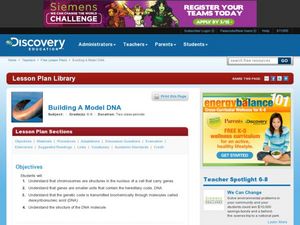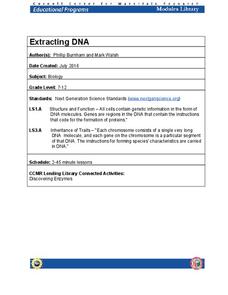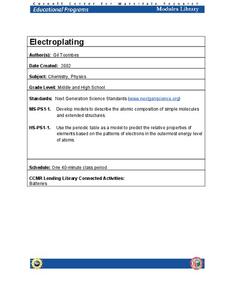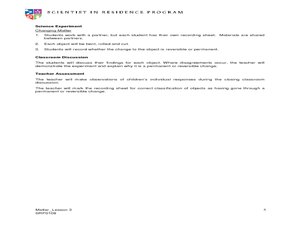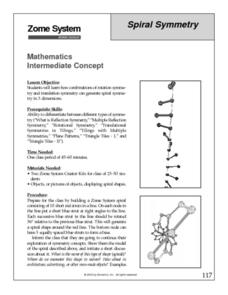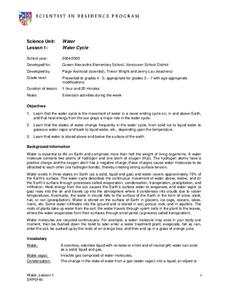Curated OER
Building a DNA Molecule, Mitosis in Motion and Mutation Gossip
Students explore three lab experiments involving DNA, mitosis, and mutation. They complete activities and play games to review DNA, mitosis and mutation concepts. They build a DNA molecule and create flip cards representing mitosis in...
Curated OER
Testing for Life
Students test for organic molecules to determine if a solution contains once living molecules. In this characteristics of life lesson, students test common liquids for the presence of organic molecules, including starch, protein, and...
Curated OER
Polymers-Greaaaaaat Biiiiiig Molecuuuuuules
Students explore polymer properties. In this instructional activity about polymers, students perform an experiment to understand polymers, their properties, and that they are formed from small molecules. Students role play pretending...
Curated OER
Bubbleology Mickey Mouse Style
Students investigate the effects of four different shaped wands and geometric shapes in a bubble solution. In this bubbleology instructional activity, the students build water and soap molecules. Students work in cooperative groups and...
University of Washington
Using Modeling to Demonstrate Self-Assembly in Nanotechnology
Do polar opposites attract? After an introduction on the polarity of molecules, pupils are asked to design a self-assembling model using materials with different polarity. The challenge should motivate learners to develop a workable...
LABScI
DNA Structure: Gumdrop Modeling
DNA molecules hold the secrets that make us unique. The fourth of 12 lessons explores the structure of DNA by building candy models. After building the models, young scientists break their models to begin the process of DNA replication....
Space Awareness
Let's Break the Particles
Build learning by breaking atoms! Young scientists study the way energy changes with a hands-on activity. As they roll steel marbles down a ramp, learners test the hypothesis that kinetic energy does not go away with friction...
Beyond Benign
Breaking the Tension
The tension builds as learners experiment in your classroom. The 17th installment in a 24-part series has scholars investigate the concept of surface tension. After discovering characteristics of surface tension, they add a compound...
Colorado State University
Can Gravity Push Something Up?
How does a hot air balloon fly? An experimental lesson has scholars build a balloon from a garbage bag and monitor the movement of air. As the temperature of the air in the balloon increases, gravity moves the denser cool air down,...
Learning Games Lab
Nitrogen in Pollutants
Responsible farming is important for maintaining natural resources. Eager scientists complete a WebQuest to explore what happens to nitrogen when it enters the soil. They learn about the chemical makeup of nitrogen-based molecules...
Science-Class.net
Rock Candy Crystals
Candy is one of my favorite words, and it's an even better word when it relates to science. Yes, candy science can happen when you grow rock candy crystals with your class. The entire process for growing these edible wonders of nature is...
Curated OER
DESKTOP ELECTROPHORESIS LAB - MOVING MOLECULES
Students build efficient electrophoresis systems for less than $15.00 each and use them to demonstrate electrophoresis ability of stain molecules and materials such as DNA.. They know that electrophoresis is a technique used for the...
Curated OER
Models of Hydrocarbons
High schoolers construct models of hydrocarbon molecules using candy and toothpicks. In this hydrocarbons lesson plan, students are given a sheet with the molecular formulas of hydrocarbons. As a group, they construct each molecule using...
Curated OER
Building a Model DNA
Middle schoolers explain the function of DNA in the body. In this biology lesson, students build a DNA model using simple materials. They demonstrate how bases pair up in the helix.
Curated OER
States of Matter Lesson
Second graders identify the three phases of matter and demonstrate how a property can change states of matter. In this states of matter lesson, 2nd graders make an Ooze to discover how a solid changes into a liquid. Students...
LABScI
Atomic Structure and the Periodic Table of Elements: The Secret Agent Lab
Food always gets attention! Model atomic structure using fruit loops to represent the subatomic particles. After building models, scholars create ionic bonds using their models. Finally, they use these concepts to create a periodic...
Cornell University
Extracting DNA
Uncover the basics of DNA structure through exploration activities. Collaborative groups build DNA models and recreate the process of replication. Then, using plant cells such as peas or strawberries, they extract a DNA sample.
Cornell University
Electroplating
Silver pennies and copper nickels are made possible by applying some chemistry. Learners use electrolysis to coat a penny with zinc sulfate and a nickel with copper sulfate. Their investigation builds an understanding of electroplating...
Curated OER
Physical Changes to Matter
Pupils explore matter by conducting an in-class experiment. They experiment with water's various forms by melting and freezing water, identifying its new shape. These observations are recorded to supplement later discussion. They also...
Curated OER
Spiral Symmetry
Taking the notion of symmetry to the next level, this looks at combining rotation and translation symmetry to build spiral symmetry in three dimensions. Using the Zome modeling system and an instructor’s guidance, geometers try to build...
Curated OER
Water Cycle
Young scientists explore Earth elements by conducting an experiment. They define water vocabulary terms such as condensation and precipitation. In addition, they conduct a water experiment in which they build a terrarium, so they can...
Curated OER
DNA and Individual Differences
Middle schoolers list differences between DNA-related terms and create a simple DNA circle map. They order terms including human body, organ, tissue, cell, nucleus, etc. from largest to smallest. They discuss differences and...
Curated OER
Three Clouds Activity
Pupils explore how clouds are produced through three different age-appropriate hands-on experiments.
Curated OER
Catering Middle-School Science: Monomers, Polymers, and Macromolecules
Students investigate foods. In this biology lesson plan, students will conduct testing on different types of foods as they learn about different molecules that make them up. Students will also learn about the shapes of the molecules.













